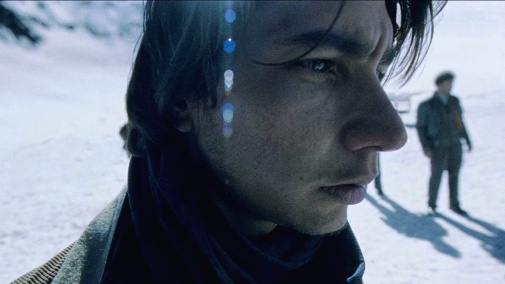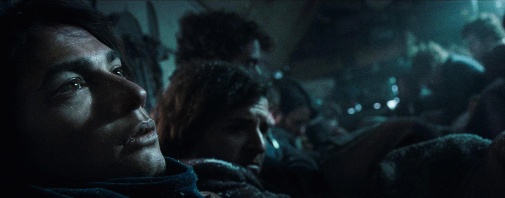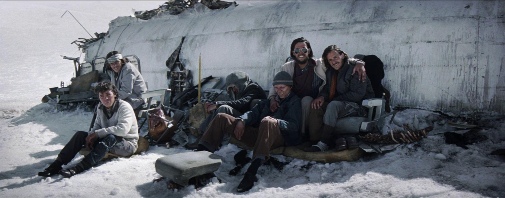No two people feels the exact same way about any film. Thus, Team Experience is pairing up to debate the merits of this year’s Oscar movies. Here’s Eric Blume and Cláudio Alves on Society of the Snow...

ERIC: Hi Cláudio, there are few finer, smarter people to discuss a film with than you. So I'm looking forward to diving into J.A. Bayona's Oscar-nominated Society of the Snow. To me, Bayona has delivered one of the best films ever in the "survival genre," a tiny slice of cinema that admittedly isn't for everyone. And perhaps I'm a sucker for these tales, as I also loved the best most recent example, Danny Boyle's 127 Hours, as well. But what I feel Bayona accomplished here, and it's no small feat, is a one hundred percent believable environment where he gets his actors to a level of despair and desperation very, very high, very, very early in the film and sustains it for almost two hours…
There's not a moment where any of the actors are coasting...they enter every scene at death's edge, carrying existential weight and scrappy resourcefulness, always looking and acting exhausted and overwhelmed. The fear and dread he conjures in his ensemble is formidable, so it never feels like a 'movie" but rather a real human experience that you're witnessing. Were you not transported by these actors?
CLÁUDIO: While I'm not as big a fan of the "survival genre" as you are, it's certainly a model of filmmaking that can capture my heart. That said, I prefer it when they're not directly correlated to real-life stories since most of those tend to be weighed down by a need to be inspirational. Or alternatively, derail into uncomfortable exploitation.

Speaking specifically of the Society of the Snow actors, I am a fan. Their work is remarkable, especially in how it captures variations of despair, how one holds on to vestiges of normalcy, of humor, of devotion, to deal with the unimaginable. Maybe because I admired their work so much, I wanted to see more. The way this script filters the story through one perspective for most of its runtime strips away the opportunity to get to know these people as a collective of fully fleshed-out individuals. I know it's futile to criticize a film by imagining an alternative version that doesn't exist, but I can't help but yearn for this cast in a production structured more like a true ensemble piece.
ERIC: Okay so it seems we're on the same page as far as the accomplishment by the actors. I feel that the nature of the story, which has a good deal of plot logistics to deal with, doesn't naturally lend itself to canvassing a dozen fully fleshed-out characters, as it truly is the collective that we're concerned about, and in fact, I think the filmmakers very consciously choose not to single out a few characters that we follow in the traditional narrative sense.
I liked that the movie eschewed the standard "these are the characters you will follow, because they last the longest" approach, and in fact, they completely upend this expectation by giving us a "narrator" who dies about midway through the plight. Our usual expectation is that the person telling the story will make it to the end, but in fact he doesn't, and I think that speaks to the conscious decision to concentrate on the collective group rather than the individual. I understand your point, and yes, who doesn't want characters to be more fully developed, but I think that's just not the approach by the filmmakers, and I was so caught up in the overall plight that I accepted the "group is larger than the individual" choice.

The technical achievement of this film is also mind-boggling to me. The sheer production details of shooting a story like this, combined with a fair amount of special effects that must be executed seamlessly into the practical footage, takes an incredible craftsman to execute, and Bayona makes it look very, very easy. And it's incredibly rare to have a director who can deliver on such high technical demands while also being so skilled with actors. I'd argue he's much, much better with this combination than, say, Christopher Nolan is in general...where Nolan's characters always feel like movie characters and never like living, breathing humans.
I'm not sure why Bayona didn't receive much greater praise this season with this film. He has a purely cinematic mind, with the precision of a technician but the compassion of a great humanist. Despite the diegree of difficulty with the location and effects, Bayona's eye (and heart) is always squarely on the human beings and their suffering and transcendence.
Come back at me, Cláudio! What do you disagree with me about?

CLÁUDIO: You say the film privileges the collective, but I'd argue it does the exact opposite. By foregrounding an individual perspective, it comes up with a protagonist whose voice and fictionalized perspective are imposed over the rest even after death. It further posits his choice not to partake in the consumption of human flesh as a moral question at the center of the picture in a way I found troublesome.
I should clarify that I was familiar with the specificities of the real-life story before watching Society of the Snow. The tragedy of Flight 571 has fascinated me for a long time, leading me to read about it, ask relatives and friends about the international public perception back in '72, and even go down the podcast rabbit hole. In other words, Numa Turcatti's fate wasn't a surprise, and I came into Society of the Snow with expectations. I was also struck by how the filmmakers take parts of other peoples' stories and integrate them into their chosen protagonist's, deliberately robbing other individual's reality to beef up the only character that merited focus in their eyes.
Such issues extend, in one way or another, to most aspects of the film. I see many of the same technical achievements you describe but also significant failures in Bayona's directorial approach. His reluctance to present the cast in group shots struck me as especially damaging, breaking their perilous communion into a series of close-ups and isolating mediums. I know blocking is a lost art in today's cinema, but such a story demands an awareness of how people share their limited space, how their bodies relate to one another. Sure, it adds impact to the last shot, when the camera finally considers the surviving cast as a whole. However, it's a disconnection between the dramaturgy and audiovisual presentation that hurts the film that came before its farewell image.

ERIC: Wow, I feel like maybe we watched two different cuts of this film. There are numerous shots of the group sleeping together in that cramped nose of the plane, where you continually get an idea of how their bodies relate to one another. And many wide shots where you see various characters doing different things in the foreground and background, and many sweeping drone and camera shots that establish the vast emptiness and hopelessness they're up against. I think Bayona did an extraordinary job of alternating between the "sweep" of the landscape and the intimacy of the human experience.
He never lets you forget the isolated horror of their every single day, but also moves into these actors' faces for raw emotion and fear. Maybe we go back and do a shot count, Cláudio! But my takeaway was that Bayona was equally adept at the technical and emotional side of cinema, full stop, from beginning to end of picture. The tension and tragedy and suspense that he is able to sustain for over two hours is, in my opinion, a colossal achievement.
CLÁUDIO: Yes, there are wide in Society of the Snow, but they're primarily establishing shots bookending scenes cut almost exclusively in medium and close-up. I can even pinpoint one of my favorite shots of the film as a remarkable moment when Bayona frames a conversation with the people in the shot outside, sitting on the snow. At the same time, the plane's carcass and its inhabitants occupy the out-of-focus background. It stands out because of its rarity. and don't even get me started on the wide lenses used for so many of the close-ups.

ERIC: I have this argument with people all the time, but I have no problem with the authors taking liberty with certain facts for the purposes of dramatization, if it's all done under a responsible pretense. The reality is that it's impossible in a two-hour film to dramatize every person's individual stories...it's too big a risk that the film will become fragmented and lose power. One of the key successes of Bayona's work here is the momentum he gets, and without some kind of unified narrative propulsion, I think the film could very easily just lay there.
As mentioned, I do not think the film gives an individual perspective...we have a narrator of sorts that helps unify the drama, but I felt ebbs and flows of many characters' experiences, and the collective experience. I was afraid for each of them and all of them, and nobody's story is truly weighted with an inordinate amount of screen time. You need some kind of narrative device to explain to the audience who of those TWO DOZEN people have died, as they are dying every day, and this was the choice they made. I think it works. I get the feeling this is just not the way you wanted them to tell this story that is obviously very close to you?
CLÁUDIO: I understand the idea of artistic freedom when dealing with real-life stories, but I can't support it in all cases. Wasn't a sense of authenticity the entire pitch of Society of the Snow? There have been exploitation films of this story in the 70s, and then an exceedingly Americanized Hollywood take from the 90s starring Ethan Hawke. This was the time when the actual story would reach the screen, complete with actors from the correct nationalities and even members of the survivors' families in minor roles - mostly seen in the last sequence.

ERIC: I was in a puddle of tears at the finale of the movie upon the rescue of the final survivors. And I barely have a heart.
CLÁUDIO: For all my qualms, I, too, was a puddle of tears by the film's end. That's part of why I can't wholly dismiss the project and why I've been defending it to friends who are way more negative about it than I am, if you can believe it. Indeed, Bayona sticks the landing, avoiding the media apparatus that was to come and finding strange warmth even when exposing his characters' emaciated bodies and shaken souls.
I've done a shout out here on this site earlier about the makeup on this project, but I'd like to bring attention to it again. The slow-but-ever-developing frostbite across these mens' faces and bodies feels so authentic, and adds so much subtle terror to the picture. It'd be my vote for Oscar in that category.
CLÁUDIO: Oh, it'd be an inspired Best Makeup & Hairstyling winner. I may be more entranced by the work done on Poor Things, but Society of the Snow may be my final pick. I cosign your praise and would like to add that the story's introduction aces the period specificity needed to immerse the audience in the characters' reality. Without that foundation, I'm not sure if the subsequent dereliction would have felt so real.

ERIC: Cláudio, we agree to disagree...the whole purpose of a Split Decision article! Before we wrap, I'd like to comment on one other thing, which is the script for this film. I know you will likely disagree on this point as well due to what you feel are decisions too far removed from the actual stories. But these kind of scripts are very, very difficult to write, because it's on some level an "action movie" and there's not a ton of dialogue, plus you need a setup before the accident. In my view, Bayona and his three screenwriters solve the structure of the film perfectly. He gives you exactly as long as you need for the setup (you don't want or need to see exactly any more or any less), a glorious set piece with the actual plane crash, and then a series of beats that push the story forward beautifully.
Usually dialogue in movies like this is horribly leaden, but every line felt realistic and true. The simple fact is that the situation is UNIMAGINABLE...nobody except the handful of people who went through it can literally imagine what each day might have been like. But the way the writers imagine it feels pure and lived-in. And I felt that every single scene was exactly what I needed...there's no fat in the film, no false set-ups, no loose ends, just one laser-focused beat after the next for you to understand the story and where these humans were at all times.
Okay, I'll leave you last word, unless you say something to make my balls burn. I do love arguing with Cláudio!

CLÁUDIO: You're completely right about what a massive challenge this was, both at the level of screenwriting and directing. While I can't say the filmmakers overcame it, I commend them for their effort and can't begrudge all the love their work has accrued this season. Would Society of the Snow be my pick to represent Spain at the Oscars or to win all those Goyas? No. Yet, I welcome its victories.
As my final note, I'd like to urge everyone to explore more of what Spanish cinema has to offer in 2023 beyond this official submission. No other nation was doing it like them last year, with such masterpieces as Lois Patiño's Samsara and Victor Eríce's Close Your Eyes shining bright on the festival circuit. Jaione Camborda's The Rye Horn is a beautiful drama on sisterhood, reproductive rights, and the fight for survival in the historical past. Foremost by Night by Victor Iriarte delivers an Iberian answer to The Official Story, which becomes an unlikely heist movie before it ends. Estibaliz Urresola Solaguren's 20,000 Species of Bees is moving beyond belief, and there's even animated excellence to consider, like Unicorn Wars, Robot Dreams, and They Shot the Piano Player. Viva España!

Society of the Snow is streaming exclusively on Netflix.